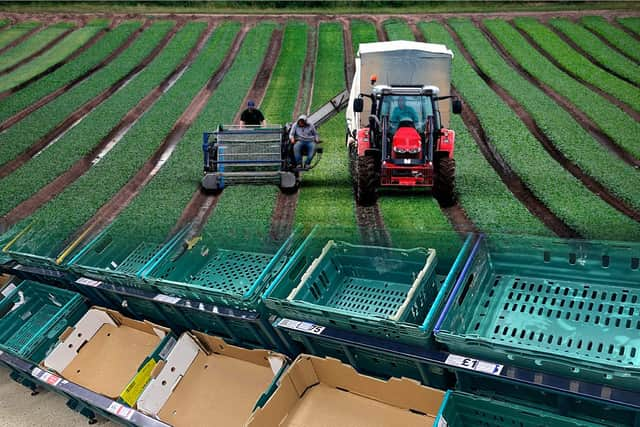When will food shortages end? Latest predictions for when fruit and veg will return to UK supermarkets
and live on Freeview channel 276
Shoppers across the UK are struggling to find key fruit and vegetable products as a result of empty supermarket shelves in fresh produce aisles.
The food shortages have been spurred by bad weather in the key food producing countries of Spain and Morocco, alongside several other factors, such as high energy costs. Everything from tomatoes to aubergines and raspberries have been affected, with the National Farmers Union (NFU) warning the situation could be “the tip of the iceberg”.
Advertisement
Hide AdAdvertisement
Hide AdSome of the UK’s biggest supermarkets - namely Tesco, Aldi, Asda, Morrisons and Lidl - have introduced restrictions on the number of fresh items consumers can buy. Industry figures have warned that the situation could eventually lead to higher prices in stores, despite the cost of living crisis challenges households are facing up and down the country.
It looks set to become the worst food supply crisis the UK has seen since the height of Covid-19 panic buying, which left many retailers struggling to fill shelves. It is also the worst crisis to affect fresh produce since the courgette crisis of 2017.
But when can we expect stock levels to return to normal - and what are supermarkets restricting the purchasing of?
What restrictions are there in supermarkets?
NationalWorld has put together a full list of the items the UK’s leading supermarkets are currently restricting.


Advertisement
Hide AdAdvertisement
Hide AdTesco is temporarily limiting the number of fresh produce items people can buy in one shop. At present, customers can buy no more than three of any one of the following products:
- Tomatoes
- Peppers
- Cucumber
Asda, which was the first supermarket to announce purchase restrictions, is currently limiting the purchase of the following fruit and veg items to three of each product per customer:
- Tomatoes
- Peppers
- Cucumbers
- Lettuce
- Salad bags
- Broccoli
- Cauliflower
- Raspberries
Aldi has restricted the following items, with customers only allowed to buy no more than three of each type of product:
- Tomatoes
- Peppers
- Cucumber
Morrisons is is temporarily limiting these items, with only two of each able to be purchased per person:
- Tomatoes
- Cucumbers
- Lettuce
- Peppers
Advertisement
Hide AdAdvertisement
Hide AdLidl has become the latest supermarket to introduce limits on the number of fresh items its customers can buy. The German discounter has barred people from buying more than three of the following fruit and veg:
- Peppers
- Tomatoes
- Cucumbers
When will fresh produce return to shelves?
Assessments of when the situation will return to normal vary by several weeks. Weather conditions have eased in Morocco, although they are still colder and duller than average in Spain - heat and light being key to the growth of fruit and vegetables.
Meanwhile, early season production in glasshouses across the UK and Northern Europe has not been at normal levels so far in 2023. The energy crisis has seen bills soar for food producers, who have partially shut down their sites as a result.
According to chief executive of food supply chain trade body the Fresh Produce Consortium, Nigel Jenney, food production in the Netherlands “is probably in the region of 80% down and they are the biggest suppliers in Northern Europe”.
Advertisement
Hide AdAdvertisement
Hide AdMr Jenney told NationalWorld that he expects the situation to rumble on well into the spring. He said we will not see “usual levels of availability” in stores until “beyond Easter” - i.e. the middle of April.
But UK glasshouse food producer trade body Lea Valley Growers Association (LVGA) - which represents 80 growers across London and the South East who produce most of the UK’s cucumbers and peppers - has told the BBC they believe the shortages could last until May because domestic growers have not been planting early season crops. "If we planted tomatoes, peppers and aubergines in December, we would be picking now,” Lee Stiles, secretary of the LVGA, told the BBC. "And if we planted cucumbers in the first week of January like we normally do, we'd be picking on Valentines Day as usual. It's too late for UK growers to step in and try and make up some of the shortfall."


Other assessments of the food shortages have been more optimistic. Department for Environment, Food and Rural Affairs (DEFRA) Secretary Therese Coffey told MPs on Thursday (23 February) that she expects the crisis will last for another month at most.
“I am led to believe by my officials after discussion with industry and retailers, we anticipate the situation will last about another two to four weeks,” she said. “It is important that we try and make sure that we get alternative sourcing options.
Advertisement
Hide AdAdvertisement
Hide Ad“Even if we cannot control the weather it is important that we try and make sure the supply continues to not be frustrated in quite the way it has been due to these unusual weather incidents.”
It comes after she was ridiculed at the annual National Farmers Union (NFU) conference in Birmingham this week for saying “we can’t control the weather in Spain”. Marion Regan, a berry grower in Kent whose farms provide Wimbledon’s world famous strawberries, told the PA news agency that Ms Coffey’s comments show she “doesn’t understand” the challenges faced by growers and horticulturists in the UK.
But Ms Coffey had her time estimate echoed by the British Tomato Growers Association (BTGA), which said consumers can expect to see “significant volumes” of British tomatoes on supermarket shelves by the end of March. Former Defra Secretary George Eustice also backed her timescale.
Comment Guidelines
National World encourages reader discussion on our stories. User feedback, insights and back-and-forth exchanges add a rich layer of context to reporting. Please review our Community Guidelines before commenting.
